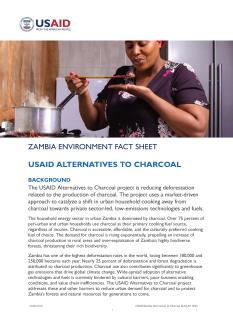The USAID Alternatives to Charcoal project is reducing deforestation related to the production of charcoal. The project uses a market-driven approach to catalyze a shift in urban household cooking away from charcoal towards private sector-led, low-emissions technologies and fuels.
The household energy sector in urban Zambia is dominated by charcoal. Over 75 percent of peri-urban and urban households use charcoal as their primary cooking fuel source, regardless of income. Charcoal is accessible, affordable, and the culturally preferred cooking fuel of choice. The demand for charcoal is rising exponentially, propelling an increase of charcoal production in rural areas and over-exploitation of Zambia’s highly biodiverse forests, threatening their rich biodiversity
Zambia has one of the highest deforestation rates in the world, losing between 180,000 and 250,000 hectares each year. Nearly 25 percent of deforestation and forest degradation is attributed to charcoal production. Charcoal use also contributes significantly to greenhouse gas emissions that drive global climate change. Wide-spread adoption of alternative technologies and fuels is currently hindered by cultural barriers, poor business enabling conditions, and value chain inefficiencies. The USAID Alternatives to Charcoal project addresses these and other barriers to reduce urban demand for charcoal and to protect Zambia’s forests and natural resources for generations to come.
|
GOALS
goal one
Reduce charcoal energy consumption by 25 percent in Lusaka and by 5 percent in urban areas outside of Lusaka.
goal two
Reduce deforestation directly attributable to charcoal production by 6.69 percent.
goal three
Identify and remove market barriers to enable a 38 percent increase in the household use of alternative technologies and fuels.
goal four
Support the Government of the Republic of Zambia to improve the business enabling environment for low emission alternative technologies and fuels.
goal five
Support alternative livelihoods in charcoal producing communities and improve capacity to regulate and enforce charcoal supply chains.
KEY RESULTS FOR 2023
Supported Energy Regulation Board to develop standards for biomass pellets, denatured ethanol for cooking and Liquefied Petroleum Gas
Supported Ministry of Energy and Ministry of Green Economy to develop a national strategy to transition Zambia away from unsustainable production and consumption of charcoal
175 community influencers and religious leaders reached more than 42,000 consumers in urban areas with messages about clean cooking
1.5 million people received clean cooking messages through advertisements and tv shows
301 Zambia Police Service officers trained to improve enforcement of the charcoal supply chain and on application of the Forest Act. 50 honorary forest officers were elected, two community forest management group committees were elected and 47 sensitization meetings were facilitated in the four target districts to raise awareness about community forestry
Two longitudinal surveys indicated that charcoal use by households decreased by 7.9 percent and the average household expenditure on charcoal increased by 8.4 percent
Falcon Gas received $1 million term sheet issued by Spark+ Africa; Chinaeli Enterprises (a woman-led Liquid Petroleum Gas distributor) received first Absa/Development Financial Corporation facility loan; Burn Manufacturing received a two-million Euro grant from the Modern Cooking Facility for Africa to scale up electric cooking in Zambia

